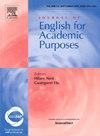Empowering academic communication in EMI higher education: Understanding the role of social-emotional need satisfaction in motivation and willingness to communicate
IF 3.4
1区 文学
Q1 EDUCATION & EDUCATIONAL RESEARCH
引用次数: 0
Abstract
Academic communication through a second/foreign language (L2) can generate much stress for students that may hamper their willingness to communicate (WTC) and motivation for learning. Guided by Collie's (2022) framework of social-emotional need satisfaction, this mixed-methods study investigates how satisfying students' basic needs for autonomy, competence, and relatedness affected their motivation and WTC at an English-medium instruction (EMI) university in China. Students' motivation was conceptualized through the notion of ideal self to include an ideal L2 self and an ideal disciplinary self to represent their desired future self-images as a competent English user and a successful subject expert, respectively. Quantitative results from structural equation modeling of questionnaire responses (N = 746) revealed that satisfying students' needs of autonomy and competence significantly predicted ideal L2 self and WTC, whereas the need of relatedness only predicted ideal disciplinary self. Qualitative analysis of interview data (N = 13) further illustrated distinct influential pathways of satisfying different needs on students' motivation and WTC, situated in specific academic communicative activities. Pedagogical implications are offered to the design of macro-level program, meso-level curriculum, and micro-level classroom teaching to support students' social-emotional needs, foster motivation, and improve WTC for academic communication in EMI higher education.
在EMI高等教育中加强学术交流:了解社会情感需求满足在交流动机和意愿中的作用
通过第二语言/外语(L2)进行学术交流会给学生带来很大的压力,这可能会阻碍他们交流的意愿和学习的动机。在Collie(2022)社会情感需求满足框架的指导下,本研究采用混合方法调查了中国一所英语教学(EMI)大学学生对自主性、能力和相关性的基本需求的满足如何影响他们的动机和WTC。学生的动机是通过理想自我的概念概念化的,包括理想的第二语言自我和理想的学科自我,分别代表他们期望的未来自我形象,作为一个称职的英语使用者和一个成功的学科专家。问卷调查结果(N = 746)的结构方程模型的定量结果显示,学生自主性和能力需求的满足显著预测理想二语自我和WTC,而相关性需求仅预测理想学科自我。访谈数据(N = 13)的定性分析进一步说明了在具体的学术交际活动中,满足不同需求对学生动机和WTC的不同影响途径。在此基础上,提出了从宏观层面的课程设计、中观层面的课程设计和微观层面的课堂教学,以支持学生的社会情感需求,培养动机,提高EMI高等教育学术交流的WTC。
本文章由计算机程序翻译,如有差异,请以英文原文为准。
求助全文
约1分钟内获得全文
求助全文
来源期刊

Journal of English for Academic Purposes
Multiple-
CiteScore
6.60
自引率
13.30%
发文量
81
审稿时长
57 days
期刊介绍:
The Journal of English for Academic Purposes provides a forum for the dissemination of information and views which enables practitioners of and researchers in EAP to keep current with developments in their field and to contribute to its continued updating. JEAP publishes articles, book reviews, conference reports, and academic exchanges in the linguistic, sociolinguistic and psycholinguistic description of English as it occurs in the contexts of academic study and scholarly exchange itself.
 求助内容:
求助内容: 应助结果提醒方式:
应助结果提醒方式:


